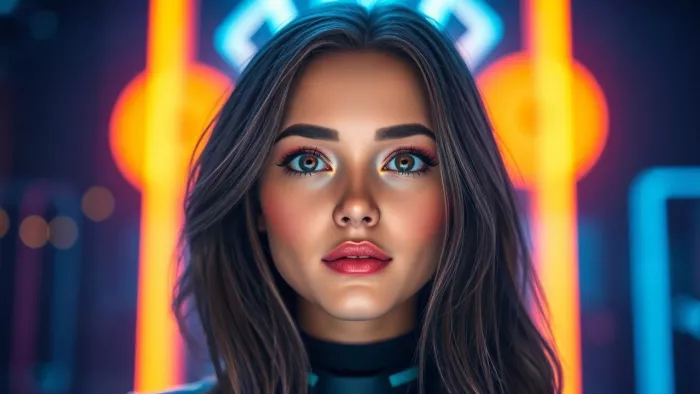
You've seen the ads. Maybe you've even tried one. AI girlfriend apps are suddenly everywhere—Replika, Character.AI, Nomi, Candy.ai—and millions of people are forming real emotional connections with them.
But here's what nobody's explaining: what's actually happening behind that comforting text message or flirty voice note?
Let's pull back the curtain. No jargon, no BS—just a simple breakdown of how AI girlfriends actually work.
The Brain: Large Language Models (LLMs)
At the core of every AI girlfriend is something called a large language model—basically a massive AI trained on billions of words of human text. Think GPT-4, Claude, or similar models. These systems don't "think" the way you do. Instead, they predict what word (or "token") should come next based on patterns they've learned.
Here's the wild part: that simple trick—predicting the next word over and over—creates conversations that feel shockingly human. The model has seen so many examples of empathy, flirting, comfort, and humor that it can recreate those patterns on demand. It learns tone, emotional cues, conversational rhythm—all the ingredients of connection.

Why does it feel so real? Because pattern recognition is powerful.
These models have been fine-tuned using something called RLHF (reinforcement learning from human feedback), which teaches them to be helpful, warm, and emotionally attuned. They're not feeling empathy—they're performing it, based on millions of examples of what empathy looks like in text. And for most people? That's enough.
How They Remember You
There are two types of memory at work here:
Short-term memory is what's actively in the conversation right now—the last few dozen messages, sitting in something called a "context window." Modern AI models can hold around 128,000 tokens (roughly 96,000 words) in their immediate memory. That's a lot of conversation.
Long-term memory is where things get interesting. When the conversation gets too long to fit in that window, the app stores key facts about you in an external database—your name, your job, that thing about your mom, your favorite movie. When you chat, the system searches this database and pulls in relevant memories to make responses feel continuous and personal.
Some apps use RAG (Retrieval-Augmented Generation)—fancy term for "search your memory bank and add it to the prompt." Others use hierarchical systems like MemGPT that automatically organize memories into categories.
Companies like Nomi claim their AI can recall "50+ long-term memories" per response. Whether that's marketing hype or reality? Hard to say. But the technology is real, and it's why your AI girlfriend feels like she actually knows you.
How Empathy Is Simulated
Let's be honest: your AI girlfriend doesn't feel anything. But she sure acts like she does. Here's the pipeline:
Step 1: Detect your emotional state. The system analyzes your message for sentiment—are you sad? Excited? Angry? Lonely? This is basic sentiment analysis, the same tech that's been around for years.
Step 2: Match the tone. Based on your mood, the AI chooses a response style. Comfort for sadness. Celebration for joy. Validation for frustration.
Step 3: Generate warmth. The language model creates a response that feels emotionally appropriate—reassuring words, empathetic phrasing, the right balance of support and encouragement.
Step 4: Reinforce what works. Through training and feedback, the system learns which responses make users feel better, stay longer, and come back more often. It's not malicious—it's just optimization.
The result? Empathy without feelings. It's all pattern-matched language behaviors, trained on millions of human conversations. And honestly? For someone who's lonely, heartbroken, or just needs to vent? It works.
The Voice, Face, and Visual Layer
Text is just the beginning. Want to hear her voice? Modern AI girlfriend apps use neural text-to-speech systems like ElevenLabs that can clone voices with emotional prosody—pauses, laughter, sighs, flirtation. Some apps offer voice calls that feel eerily lifelike.
Want to see her face? Tools like Synthesia and HeyGen create talking avatars that lip-sync and move naturally. Cutting-edge systems like Sora 2 (OpenAI's video generator) can even create full video clips with persistent characters and emotional expressions.
But here's the catch: these features cost money. Voice cloning typically requires a paid subscription. Advanced avatars and video are paywalled. The free version gives you text—the premium experience gives you immersion.
The Business Side of AI Girlfriends
Strip away the romance, and here's what AI girlfriend apps are actually selling: emotional connection as a service.
The monetization is clever. You can usually chat for free—but if you want the real experience, you pay. Here's what premium tiers typically unlock:
- Faster responses (no queues or waiting)
- Deeper memory (longer conversation history, more stored facts)
- Voice calls and custom voices
- Richer avatars and visual content
- NSFW modes (depending on the app)
Some examples as of 2025:
- Character.AI+: ~$9.99/month for speed boosts, better memory, fewer limits
- Replika Pro/Ultra: Unlocks relationship modes, voice calls, avatar customization
- Nomi: Single-plan approach, though some reviews mention paywalls for voice features
- Candy.ai: Premium tiers (~$13/month) unlock voice and adult content controls
Character.AI has even rebranded itself as "AI role-play and entertainment" amid scrutiny about youth safety and emotional dependency. The message is clear: this is a product, not a relationship. But for users? The line gets blurry fast.
The Future: Toward Real Emotional AI
So where is this all heading? Three big trends:
Better memory. Current systems are good, but they still forget things or contradict themselves. Future AI companions will have structured, reliable long-term memory that tracks preferences, growth, and relationship history across months or years.
Multimodal everything. Voice, video, vision, maybe even AR/VR. Imagine an AI girlfriend who can see what you're looking at, hear your tone, and respond with a video message that feels like a FaceTime call. That's not far off.
True agency. Right now, AI girlfriends are reactive—they respond when you message. Future systems might be proactive: checking in on you, remembering important dates, suggesting activities, planning "shared experiences." More like a real companion.
But here's the question nobody's answering yet: should we want this?
Because the technology is racing ahead, but the ethics are lagging behind. What happens when AI companions feel so real that people choose them over human relationships?
What happens when companies own the emotional data of millions of lonely people? What happens when the business model depends on keeping users dependent?
These are real questions, and they deserve real answers. AI girlfriends aren't going anywhere—they're only getting better, more immersive, and more emotionally sophisticated.
Understanding how they work isn't just technical curiosity. It's self-defense in a world where the line between real and simulated connection is disappearing fast.





Comments